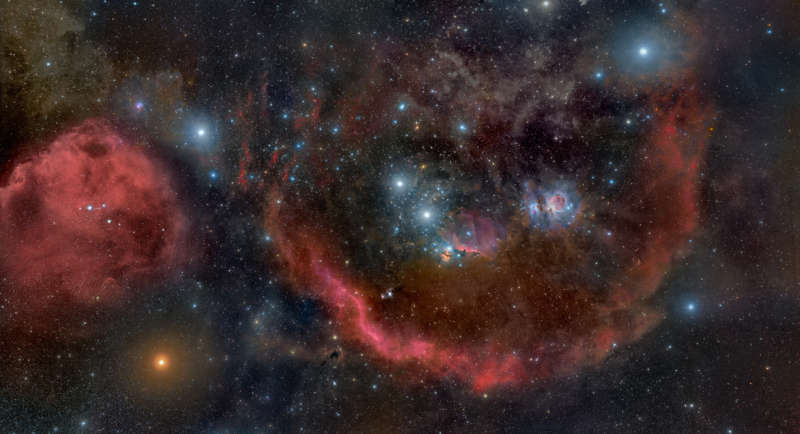
|
Credit & Copyright: Rogelio
Bernal Andreo
Explanation:
Cradled in cosmic dust and glowing hydrogen,
stellar
nurseries in Orion the
Hunter
lie at
the edge of a giant molecular cloud some 1,500 light-years away.
Spanning nearly 25 degrees, this breath-taking vista
stretches across the well-known constellation
from head to toe
(left to right).
The Great Orion
Nebula, the closest large star forming region, is right of center.
To its left are the
Horsehead Nebula,
M78, and
Orion's belt stars.
Sliding your cursor over the picture will also find
red giant Betelgeuse at the hunter's shoulder,
bright blue Rigel
at his foot, and the glowing Lambda Orionis
(Meissa) nebula at the far left, near Orion's head.
Of course, the Orion Nebula and bright stars are
easy to see with the
unaided eye, but dust clouds and emission from the extensive interstellar
gas in this nebula-rich complex,
are too faint and much harder to record.
In this mosaic of broadband telescopic images, additional image
data acquired with a narrow
hydrogen alpha filter was used to
bring out the pervasive tendrils of energized
atomic hydrogen gas and the arc of the giant
Barnard's Loop.
|
January February March April May June July August September October November December |
| ||||||||||||||||||||||||||||||||||||||||||||||||
NASA Web Site Statements, Warnings, and Disclaimers
NASA Official: Jay Norris. Specific rights apply.
A service of: LHEA at NASA / GSFC
& Michigan Tech. U.
Based on Astronomy Picture
Of the Day
Publications with keywords: Orion - Orion Nebula - Horsehead Nebula - M 87 - hydrogen
Publications with words: Orion - Orion Nebula - Horsehead Nebula - M 87 - hydrogen
See also:
